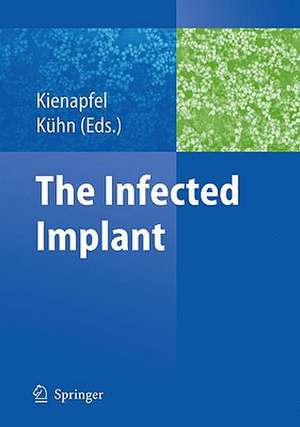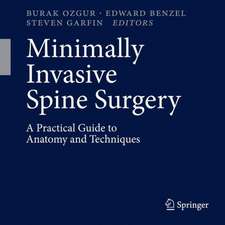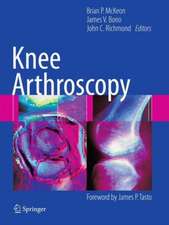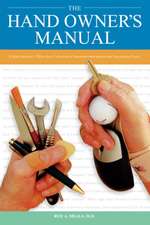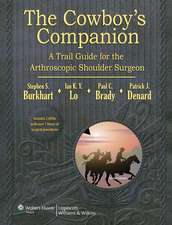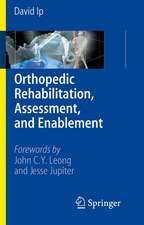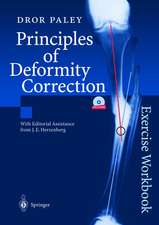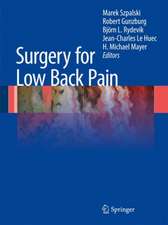The Infected Implant
Editat de Heino Kienapfel, Klaus-Dieter Kühnen Limba Engleză Paperback – 7 aug 2009
his family and the health care services, as they may lead to functional
impairment, long lasting disability, or even permanent handicap.
This problem may also have socioeconomic implications. Infection
commonly results in prolonged use of antibiotics, multiple operations,
complications, extended rehabilitation and long lasting followup
visits with additional costs for the health care provider.
This book covers contributions from international experts who came
together in Potsdam, Germany, at the invitation of Professor Heino
Kienapfel, MD PhD, of the Department of Special Orthopaedic
Surgery and Traumatology of the Centre of Joint Arthroplasty,
Auguste Viktoria Clinics Berlin.
The focus of this book is the state of the art of:
-Antimicrobial Resistances: Facts and Statistics
- Arthroplasty Registers in EU: Status and Development
- Microbiology in Arthroplasty
- Strategies in Antibiotic Treatment
- Spacer Management: Clinical Experiences and Requirements
- Biofilm Creation: Low Grade Infection
- Revision: Cemented vs. Cementless
- Revision: One-stage vs. Two-stage treatment
Preț: 710.79 lei
Preț vechi: 748.20 lei
-5% Nou
Puncte Express: 1066
Preț estimativ în valută:
136.05€ • 147.83$ • 114.36£
136.05€ • 147.83$ • 114.36£
Carte tipărită la comandă
Livrare economică 22 aprilie-06 mai
Preluare comenzi: 021 569.72.76
Specificații
ISBN-13: 9783540928355
ISBN-10: 3540928359
Pagini: 139
Ilustrații: X, 139 p.
Dimensiuni: 170 x 244 x 23 mm
Greutate: 0.3 kg
Ediția:2009
Editura: Springer Berlin, Heidelberg
Colecția Springer
Locul publicării:Berlin, Heidelberg, Germany
ISBN-10: 3540928359
Pagini: 139
Ilustrații: X, 139 p.
Dimensiuni: 170 x 244 x 23 mm
Greutate: 0.3 kg
Ediția:2009
Editura: Springer Berlin, Heidelberg
Colecția Springer
Locul publicării:Berlin, Heidelberg, Germany
Public țintă
Professional/practitionerCuprins
The Importance of European Registers in Respect to Infections in Arthroplasty.- Increasing Incidence of Infected THA in Norway Despite Improved Antibiotic Prophylaxis.- Update from the Swedish Arthroplasty Registers with Special Reference to Infections.- Status and Prospect of an European Arthroplasty Register (EAR).- The Infected Implant — Microbiology and Clinical Strategies.- Infection of Joint Prosthesis and Local Drug Delivery.- Clinical Strategy for the Treatment of Deep Infection of Hip Arthroplasty.- Infection after Total Knee Artroplasty: Diagnosis, Management Strategies and Outcomes.- Spacer Management in Periprosthetic Infections.- Observational Study of Bone Cement with Two Antibiotics in Revision Arthroplasty of Knee and Hip.- Treatment of an Infected Joint Prosthesis: Difficult Challenge for an Orthopedist Surgeon.- Low-Grade Infection and Multiresistant Gram-Positive Cocci.- Antibiotic Strategies in Septic Arthroplasties.- Introduction: Revision Cemented Versus Uncemented.- Cemented revision THA.- Pro Uncemented Revision.- The Infected Implant: Revision One Stage Versus Two Stage — Introduction To Crossfire Session.- One Stage Revision — Favourite Option?.- Advantages of Two-Stage Revision Arthroplasty.
Textul de pe ultima copertă
Musculosketal infections are potentially devastating for the patient, his family and the health care services, as they may lead to functional impairment, long lasting disability, or even permanent handicap. This problem may also have socioeconomic implications. Infection commonly results in prolonged use of antibiotics, multiple operations, complications, extended rehabilitation and long lasting follow-up visits with additional costs for the health care provider. The 2nd International Arthroplasty Symposium „The Infected Implant" brought together international experts and will concentrate on infections: development, microbiology, diagnostics, statistics and therapy of the infected implant. Concerning microbiological diagnostics, a major challenge is the differentiation between septic and aseptic prosthesis loosening. Biofilm formation at low grade infections will therefore be one of our main topics at the event in 2008. Furthermore, the issue of antibiotic resistances, which is always a hot topic,will be discussed, based on new clinical and epidemiological data.These days, a number of options for the therapy of the infected implant are available. Lectures about the rational use of antibiotic medication and theapplication of antibiotic containing spacers will represent key topics of this meeting. The question whether revision surgery should be cemented or not will be another subject of the panel discussion, where clinicians of different countries worldwide will present their revision cases. A third part of the symposium will cover consequences and economical aspects of infected implants. The speakers will focus on the different European Arthroplasty Registers, but the issue of reimbursement practices within the EU will also be discussed.
Caracteristici
Includes supplementary material: sn.pub/extras
